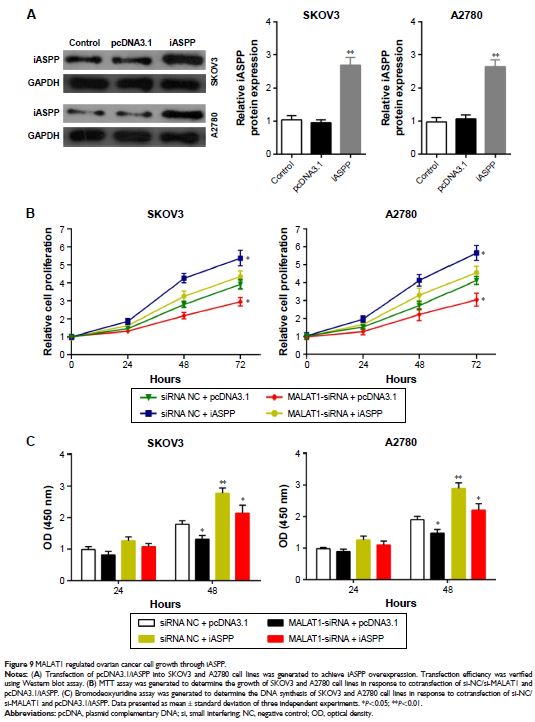109568
论文已发表
注册即可获取德孚的最新动态
IF 收录期刊
- 3.4 Breast Cancer (Dove Med Press)
- 3.2 Clin Epidemiol
- 2.6 Cancer Manag Res
- 2.9 Infect Drug Resist
- 3.7 Clin Interv Aging
- 5.1 Drug Des Dev Ther
- 3.1 Int J Chronic Obstr
- 6.6 Int J Nanomed
- 2.6 Int J Women's Health
- 2.9 Neuropsych Dis Treat
- 2.8 OncoTargets Ther
- 2.0 Patient Prefer Adher
- 2.2 Ther Clin Risk Manag
- 2.5 J Pain Res
- 3.0 Diabet Metab Synd Ob
- 3.2 Psychol Res Behav Ma
- 3.4 Nat Sci Sleep
- 1.8 Pharmgenomics Pers Med
- 2.0 Risk Manag Healthc Policy
- 4.1 J Inflamm Res
- 2.0 Int J Gen Med
- 3.4 J Hepatocell Carcinoma
- 3.0 J Asthma Allergy
- 2.2 Clin Cosmet Investig Dermatol
- 2.4 J Multidiscip Healthc

长非编码 RNA MALAT1 调节的微小 RNA 506 通过靶向 iASPP 调节卵巢癌生长
Authors Lei R, Xue M, Zhang L, Lin ZQ
Received 12 May 2016
Accepted for publication 11 October 2016
Published 19 December 2016 Volume 2017:10 Pages 35—46
DOI https://doi.org/10.2147/OTT.S112686
Checked for plagiarism Yes
Review by Single-blind
Peer reviewers approved by Dr Narasimha Reddy Parine
Peer reviewer comments 2
Editor who approved publication: Dr Faris Farassati
Abstract: MALAT1, an important cancer-associated long noncoding RNA (lncRNA),
contributes to the development and progression of several cancers. Disordered
expression of MALAT1 has been observed in several cancers, including cervical
cancer, breast cancer, and ovarian cancer. However, the exact effects and
molecular mechanisms of MALAT1 in ovarian cancer progression are still unknown.
Here, we investigated the role of MALAT1 in human ovarian cancer cell lines and
clinical tumor samples, in order to determine the function of this molecule. In
our research, lncRNA-MALAT1 was specifically upregulated in ovarian cancer cell
lines and promoted ovarian cancer-cell growth through targeting microRNA
(miR)-506. Knockdown of MALAT1 inhibited the proliferation and DNA synthesis of
human ovarian cancer cell in vitro. In addition, miR-506-dependent iASPP
regulation was required in MALAT1-induced ovarian cancer-cell growth. These
findings indicated that MALAT1 might suppress tumor growth via
miR-506-dependent iASPP regulation. Taken together, our data indicated that
MALAT1 might be an oncogenic lncRNA that promotes proliferation of ovarian cancer
and could be regarded as a therapeutic target in human ovarian cancer.
Keywords: lncRNA, MALAT1, miR-506, ovarian
cancer, iASPP
